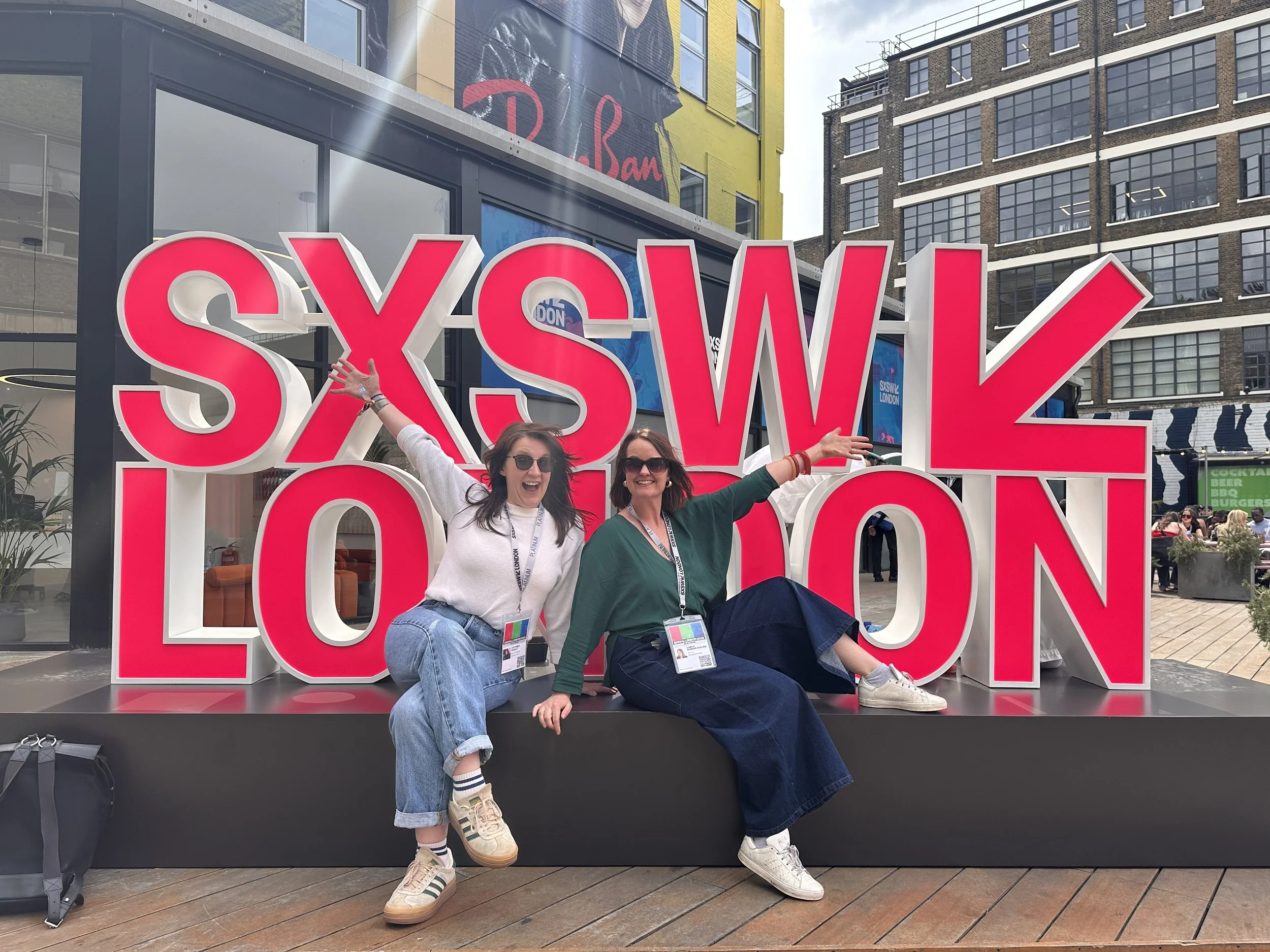SXSW London: a round up, from our founder
SXSW London, in it’s first ever year was a welcome shot in the arm of energy, ideas, and industry crossover. I came out inspired by music, film, tech, gaming, fashion, and everything in between.
Here's my attempt to pull together a myriad of notes from all the panels, conversations, and moments of incredible clarity.
1. AI talk was everywhere, but it’s not everything.
From government to filmmaking, the transformative role of AI was undeniable. Tony Blair emphasized AI’s potential to support public services like healthcare, not replace them. Meanwhile, filmmakers are already using AI to manage admin and post-production tasks, helping small teams do big things with fewer resources. VC firms are investing massively in AI, but there's caution too: investors are wise to copy-paste applications of ChatGPT disguised as innovation.
The real opportunity? Using AI as a creative companion, not a crutch.
2. Culture, gaming & the algorithm
Gaming platforms like Roblox and Fortnite are now serious vehicles for cultural engagement. The BBC is embedding shows like Eurovision and even live rap battles into gaming spaces, and seeing real-world results.
Creators like Sam Ryder reminded us not to chase the algorithm at the expense of instinct. Viral success might get you attention, but sustainable growth requires creativity, resilience, and trusting your gut.
3. Music & Film: where creativity still thrives
The most surprising alignment? How much the music industry mirrors the WAAM business model. Artist management teams operate like mini-startups—recording, releasing, marketing, and building communities all in-house.
September Management’s success (Adele, Little Simz, M.I.A.) comes from staying small, agile, and focused on 1:1 connections through first-party data. The team built Adele a record-breaking, custom stadium show in a Munich car park—proof that bold ideas and tight teams can outpace the big players.
Same goes for film: the industry is experimenting with democratised filmmaking, AI tools, and fresh formats. The takeaway? Ideas are cheap—execution is everything.
4. Fashion, sport & the power of IRL experiences
From Gucci to Dina Asher-Smith, physical presence and experience are at the core of future-facing brand strategies. Gucci is treating its digital ecosystem as an “amplifier,” not a replacement, for in-store engagement. Sport is embracing a “house of brands” model—celebrating individual players as part of a broader collective.
Fashion is also getting real: cuts that work, pieces that last, black that hides the dirt. Utility and luxury aren’t at odds—they’re becoming intertwined.
5. Marketing: time to catch up
Panels from big brands like Unilever and Diageo showed signs of hope—talking about putting “joy” back into marketing and moving away from mechanical precision. There’s an embrace of AI tools and a push for community-building.
But truthfully? These talks felt a little late to the party. Small brands have been doing this for years. The problem isn’t lack of ideas—it’s operational inertia. Burnout, budget cuts, and rigid structures are slowing marketing down when it needs to speed up.
6. Logistics, tech & the last mile
From Just Eat’s drone deliveries to InPost’s parcel locker expansion, the logistics space is booming with innovation. With EVs creating more “dwell time,” brands are rethinking what delivery, convenience, and consumption look like in real time.
InPost’s growth—especially in resale and rental economies—shows how smart infrastructure can reshape behaviour. The battle now? Win hearts and minds, not just locations.
7. Community, ownership & independence
Across the board, from music to fashion to digital creators, there’s a shared rallying cry: own your audience. Platforms like Koalo are helping creators shift from “rented land” (Instagram, YouTube) to their own apps, data, and communities. That ownership is power—and sustainability.
Whether it’s a management company building CRM systems, a digital fashion platform booking in-store appointments, or a musician building a fanbase outside of Spotify, the future belongs to those who build direct connections.
Plus, A few moments that were just purely inspirational
Madame Gandhi reminded us to focus on what we can control—our peace, our impact, our community.
Cindy Gallop (as always) made a powerful case for sex-positive, gender-conscious education and activism.
Dina Asher-Smith brought grace and insight to how sport and fashion are evolving together.
Bimini was Bimini—no notes, just joy.
Final Reflection: Brands must find inspiration beyond the bubble.
I left SXSW London feeling more inspired by adjacent industries than by my own. Music, film, logistics, tech—these fields are experimenting, iterating, doing. Marketing, in contrast, often talks about change without having the tools or culture to act on it.
When I spoke to people about what we’re building at We Are All Marketing & Creative, the excitement was real. It reminded me: we don’t need to wait for permission to innovate. The blueprint is already there—just maybe not in our usual echo chambers.

